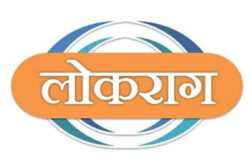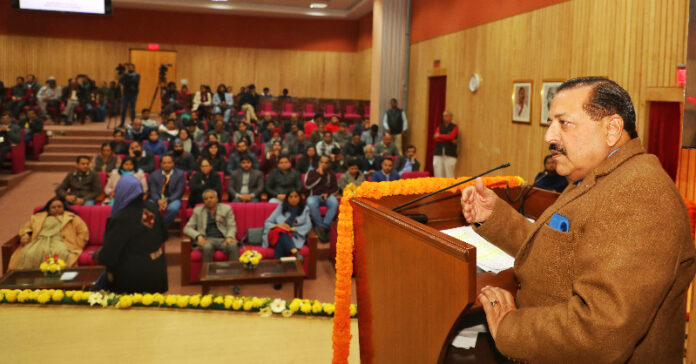Indian diaspora is playing a key role in overall global economic growth and they are adding value to the countries and societies where they are settled though at the same time they continue to be rooted with their motherland, Union Minister Dr Jitendra Singh said.
Today’s India beckons them back with more opportunities and greater ease of work, he said. The Union Minister was addressing a ceremony in New Delhi to announce the results of the first Vaishvik Bharatiya Vaigyanik (VAIBHAV) Fellowship calls and launch of the next cycle of the VAIBHAV call.
Dr Jitendra Singh emphasized that our Indian diaspora in Science, Technology, Engineering, Mathematics and Medicine (STEMM) are playing a key role in determining the direction of where our society and the world is moving by bringing technological changes and using it in innovative ways, particularly in social and developmental sectors.
“I would like to quote the memorable words of the Prime Minister at the Pravasi Bharatiya Divas event in 2017, he said that ‘Hamara toh khoon ka rishta hai, passport ka nahi,’ and that one phrase, I think, captures the entire complexity of a relationship that we have today with over 34 million People of Indian Origin and Non-Resident Indians abroad and that is what brings us here,” Dr Singh said.
Highlighting the importance of VAIBHAV, Dr Jitendra Singh said that the VAIBHAV Fellows are from topmost institutes of Australia, Canada, Finland, Japan, Singapore, Sweden, Switzerland, UK, USA and would be engaged to Indian institutes like IITs, IISc and so on during next 3 years working on jointly identified problems. This will certainly lead the way in establishing research capability as an important avenue towards Aatmanirbhar Bharat.
“The Distinguished VAIBHAV fellows would network with Indian academic Institutions and would attempt to create a collaborative network of cutting-edge research programmes in sync with the priority areas of Government of India. The fellows would facilitate an exchange of best practices between the two countries and attempt to address the areas of concern in collaborative research between the two countries,” the Union Minister pointed out.
Dr Jitendra Singh said, “The VAIBHAV Fellows who are coming to India would surely notice the many changes in the last over nine years under the Modi Government, especially a quantum jump in India’s position in the Global Innovation Index. Indian scientists and researchers have been at the forefront of cutting-edge discoveries and advancements across multiple disciplines. Indian minds have pushed the boundaries of scientific understanding and have fostered innovation that benefits humanity as a whole in areas ranging from space exploration to artificial intelligence, from biotechnology to nanotechnology. These achievements highlight India’s commitment to scientific progress and technological innovation. The country’s advancements in various fields hold promise for addressing societal challenges, fostering economic growth, and contributing to global scientific endeavors,” he added.
Prof. Abhay Karandikar, Secretary DST said that as India is a developing country, we still have many scientific areas which need to be strengthened further such as Renewable Energy, Waste to Energy, Electric Vehicles, Cyber Physical Systems, Quantum Technologies, Future Manufacturing, Blue Economy, Affordable Health Care and so on. “We believe that the Indian diaspora working in other countries would be able to expand the horizons of Indian researchers with their knowledge and experiences. They can help and guide our Indian researchers with their unique thought process,” he stressed.
He emphasized that the Indian Diaspora may connect with Indian faculty, researchers and students as well, to give them a new perspective towards research, development and innovation. “Nowadays, research is not limited to laboratories of Institutes but going further to develop new technologies, products in collaboration with Industries. Therefore, it is needed that we all may understand the importance of outcome-based research,” he added.
“We expect that the Indian hosts will adapt the best practices on research, development and innovation. There is a need to build strong bond which may last long with fruitful outcomes and welfare of society,” Professor Karandikar pointed out.
The Department of Science and Technology (DST), Government of India, is implementing the Vaishvik Bharatiya Vaigyanik (VAIBHAV) Fellowship Program. A total of 302 applications were received under this call which were evaluated by expert review committees in concerned research domains. The recommendations of ERCs were reviewed by the Apex Committee and 22 VAIBHAV Fellows and 2 Distinguished VAIBHAV Fellows were recommended. The VAIBHAV Fellows would identify an Indian Institution for collaboration and may spend up to two months in a year for a maximum 3 years.
The Distinguished VAIBHAV Fellow would identify an Indian Institution for collaboration and may spend minimum one week and maximum two months in a year for a maximum of 3 years. The Distinguished VAIBHAV fellows would network with Indian academic Institutions and would attempt to create a collaborative network of cutting-edge research programmes in sync with the priority areas of Government of India. The fellows would facilitate an exchange of best practices between the two countries and attempt to address the areas of concern in collaborative research between the two countries.















